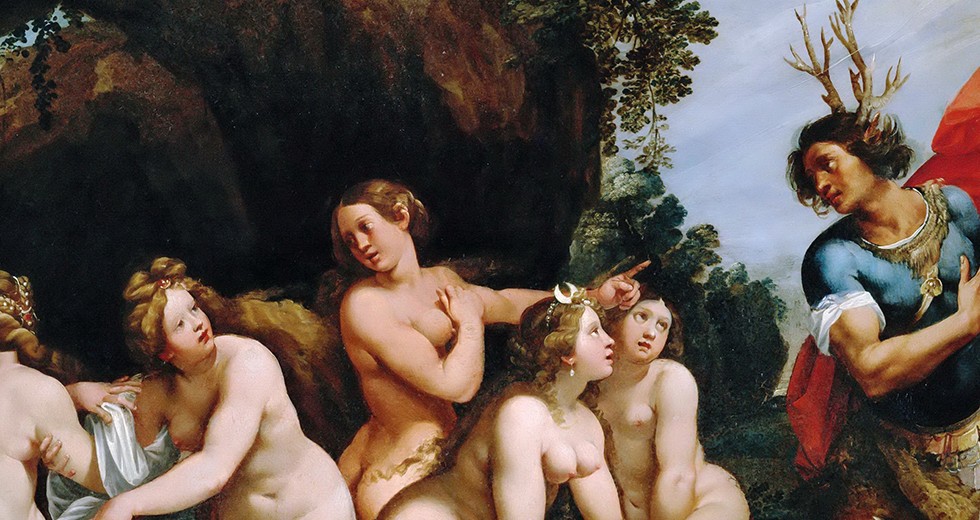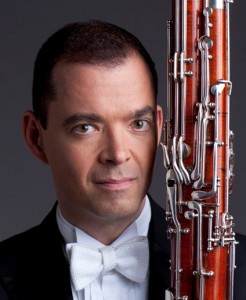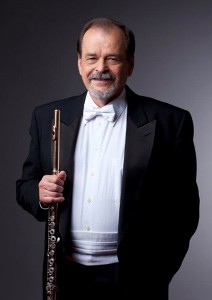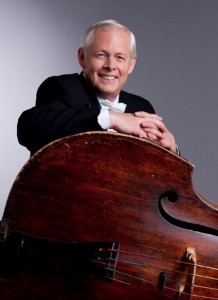
Playing in the Chicago Symphony Orchestra is more than a full-time job, when all the concerts, tours, rehearsals and practices are figured in. Yet many of its members still manage to find time to perform in other niche ensembles or tackle solo engagements.
For some, this musical moonlighting means crossing into early music, which goes back to the Middle Ages and Renaissance but focuses mainly on the Baroque Era — roughly 1600 to 1750 — and composers such as J.S Bach, Jean-Philippe Rameau and Antonio Vivaldi.
 Assistant principal bassoonist William Buchman (at left), violinist Fox Fehling and piccolo/flutist Jennifer Gunn are among the CSO members who perform with Chicago’s Music of the Baroque, for example, and principal trumpeter Christopher Martin will be a soloist May 2 at this year’s Bach Week Festival.
Assistant principal bassoonist William Buchman (at left), violinist Fox Fehling and piccolo/flutist Jennifer Gunn are among the CSO members who perform with Chicago’s Music of the Baroque, for example, and principal trumpeter Christopher Martin will be a soloist May 2 at this year’s Bach Week Festival.
For these musicians, such performing opportunities take them into musical realms that they have little opportunity to explore with the CSO, which mostly showcases post-Baroque works by composers ranging from Wolfgang Amadeus Mozart to Dmitri Shostakovich. (This season did feature a Baroque program in February with guest conductor Nicholas McGegan, and on May 8-10, Bernard Ladabie will lead the CSO in works by 18th century composers Rigel and Kraus, along with pieces by Classical-era greats Haydn and Beethoven.)
On a recent program with the Music of the Baroque, Buchman, for example, performed for the first time excerpts from Handel’s Apollo e Dafne, including an aria with a very challenging bassoon part. “It allows me to study and perform a lot of repertoire that I otherwise would never get to do,” he said of his time with the specialized group. Buchman also has performed with other local early music players, including the musicians who went on to establish Haymarket Opera Company, which specializes in Baroque-Era rarities. (Its latest production is a double bill of Charpentier’s “Le jugement de Pan” and “Actéon.”)
But more than just a change in repertory, venturing into early music also requires a shift in musical attitudes and often even a shift in instruments. While the Music of the Baroque performs on modern instruments in a historically informed way, members of Chicago-based ensembles such as Baroque Band and Newberry Consort, play period instruments: either actual instruments from the Baroque Era (and sometimes earlier) or close reproductions. These instruments often sound and function quite differently than their modern counterparts.
In much of the 20th century, Baroque music was played in largely the same way as later Romantic-Era music by Brahms or Tchaikovsky. In the 1960s and ’70s, groups such as the Academy of Ancient Music launched a revolution by attempting to perform early music in a manner as close as possible to how it would have been heard at the time it was composed.
That typically meant smaller, more intimate ensembles, different tuning norms and of course, a move to historically appropriate instruments. For the strings, it required, among other things, switching from steel to gut strings, using a different style of bow held in a looser manner and performing with little or no vibrato. The result was a lighter, leaner and more organic sound that, perhaps ironically, seemed more contemporary to many ears.
 “Stylistically and phrasing-wise, there was much more attention to the vertical alignment of the music, rather than only the horizontal alignment,” said Richard Graef (at right), the CSO’s assistant principal flutist, who will perform in a program titled “Their Master’s Voice” on March 19-22-with the Baroque Band. “In other words, they were much more aware of every note you play, and its relationship to the underlying chord structure, and you played all those notes with slightly different emphasis, so that you get within the phrasing, a lot more gesture, a lot more subtlety in a Baroque style rather than a beautiful, long, sustained Tchaikovsky line.”
“Stylistically and phrasing-wise, there was much more attention to the vertical alignment of the music, rather than only the horizontal alignment,” said Richard Graef (at right), the CSO’s assistant principal flutist, who will perform in a program titled “Their Master’s Voice” on March 19-22-with the Baroque Band. “In other words, they were much more aware of every note you play, and its relationship to the underlying chord structure, and you played all those notes with slightly different emphasis, so that you get within the phrasing, a lot more gesture, a lot more subtlety in a Baroque style rather than a beautiful, long, sustained Tchaikovsky line.”
During the first decades of the period-instrument movement, the battles between the period-instrument advocates and modern-instrument defenders were often quite heated, but these two parallel universes exist now largely in harmony and even blur into each other. Thus, New York’s Juilliard School offers a graduate degree in period-instrument performance, and symphony orchestras try to incorporate some period-instrument approaches when they do take on Baroque music, sometimes hiring guest conductors who are specialists in the realm, such as Nicholas McGegan, a regular CSO guest conductor.
Graef became fascinated with the nascent period-instrument movement that was sprouting mainly in Europe at first. Around 1974, he helped found one of the first such groups in the United States: the Chicago-based Fiori Musicali. At the time, he learned to play a Baroque flute known as a traverso – a wooden instrument with six holes and one key. The traverso was popular for about 100 years beginning in the 1670s. To contemporary ears, its sound more closely resembles that of a recorder than of a modern flute, and possesses a less homogeneous sound than the latter.
“Essentially, every note on the Baroque flute has its own unique color and projection, and a good Baroque flutist finds that unique color,” said Graef, who performs on a modern reproduction. “Some of the notes are very muted, because of the fingering. Others are very full and projected.”
In addition to performing regularly on the traverso, he teaches a course on Baroque flute at the Northwestern University and leads instruction on the instrument at Roosevelt University. “I think I’m one of the few flutists, at least in this country who has an active career in a modern symphony orchestra and who is also playing period flute,” Graef said. “My feeling has always been that they should not be that divorced from each other.”
 CSO bassist Roger Cline started playing bass viol or bass viol da gamba more than 20 years ago when Graef was looking for someone to play continuo, a kind of bass line in Baroque works, in early-music performances with him.
CSO bassist Roger Cline started playing bass viol or bass viol da gamba more than 20 years ago when Graef was looking for someone to play continuo, a kind of bass line in Baroque works, in early-music performances with him.
The violin and viol families of instruments share similarities, but the viol has a flat back with sloped shoulders and six or seven strings (compared to four strings on a double bass). The bass viol is slightly smaller than a cello, and is usually held between the legs instead of resting on the floor with an endpin or spike.
Cline, who most often performs early music now with a group at his church or informally with friends, plays a reproduction of a 1630 English instrument that was made by Wesley Brandt, a viol maker in Portland, Ore.
Switching back and forth from the viol to a modern bass holds plenty of challenges, including bowings that are mirror opposites on the two instruments, but Cline has gotten used to the differences over time and compared playing the two instruments to being bilingual.
“When you play a viol, you cannot force it,” he said. “It will not respond that way. And when I play now in the [CSO], that part of playing on the viol helps me, because I relax more, and I can get a better sound on the modern instrument as well.”
Kyle MacMillan is a Chicago-based writer and reviewer.
PHOTOS: A detail from the painting Diana and Actaeon, which depicts the prince Actaeon, hunting in the forest and then stumbling upon the grotto where the goddess Diana and her companions were bathing. This Greek myth provides the inspiration for Charpentier’s opera Actéon, (below) which Haymarket Opera Company will perform March 7-8.
…
UPCOMING EARLY MUSIC PERFORMANCES
Haymarket Opera Company
Charpentier’s “Le jugement de Pan” and “Actéon”
March 7, 7:30 p.m.; March 8, 5 and 8 p.m.
(773) 381-4551; haymarketopera.org
Baroque Band
“Their Master’s Voice”: works by J.S. Bach, W.F. Bach, C.P.E. Bach and Telemann
March 19, 7:30 p.m., Symphony Center (Grainger Ballroom); March 21, 7:30 p.m., Evanston; March 22, 7:30 p.m., Hyde Park
(312) 235-2368; baroqueband.org
Bach Week Festival
April 25, 7:30 p.m., Evanston; May 2, 7:30 p.m. and May 4, 2:30 p.m., Chicago
(847) 293-6686; bachweek.org
The Newberry Consort
“Celestian Sirens: Music from the Mexican Convent of the Encarnación”
May 2, 8 p.m.; May 3-4, 3 p.m.
Music of the Baroque
Handel, Vivaldi, C.P.E. Bach, Rameau
May 18, 7:30 p.m., Skokie; May 19, 7:30 p.m., Harris Theater for Music and Dance, Chicago
(312) 551-1414; baroque.org